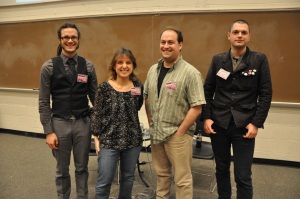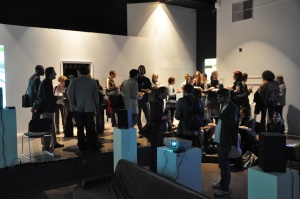
Co-authored with Nathan Jurgenson for the UMD Sociology Department Newsletter.
The crowd is gone, the banners rolled back up, the rooms cleaned, and now we have a chance to sleep–and reflect on Theorizing the Web 2012. After two successful years, the conference—born as a fun idea and with humble expectations—has morphed into an institution in that sociological sense of the term. We’re proud of Theorizing the Web and those who made it a success: our committee and the attendees.
For those who don’t know, this conference is a grad-student-production through and through. We had a terrific committee again this year, which included sociology grad students Tyler Crabb, Rachel Guo, Zach Richer, Jillet Sam, David Strohecker, Matthias Wasser, Sarah Wanenchak, and William Yagatich. Dan Greene from American Studies also joined the team this year. Additionally, we’d also like to recognize Ned Drummond (our designer), Rob Wanenchak (our photographer), and DJ Sean Gray, who you might remember as a former sociology undergrad. Also, we had terrific sponsors, especially the sociology department, who has supported this event in any and every way that we’ve asked. We’re very lucky to be here.
We created the conference for the simple reason of wanting something we were not getting at other conferences. First, there is the substantive focus of the event: theory sessions at disciplinary conference seldom feature presentations that focus on the radically transformative nature of the Web, while tech sessions and tech conferences tend to focus solely on description rather than on making theoretical arguments. Without an apparent space to theorize the Web it became clear that we needed Theorizing the Web.
But if we’re going to make a conference, we’re going to make one we want to attend. The cost? Pay-what-you-want. Grad students could attend for $1, and those who could afford it donated generously. The program should be filled with smart, clearly presented theories from a range of perspectives. Viewpoints often neglected at tech conferences, be they critical, queer, feminist, etc, undergird the entire event, rather than being ignored or placed in token sessions. More than interdisciplinary, this conference is also non-disciplinary, taking very seriously the importance of non-academic knowledges to gain insights about the social world. An art gallery, film screening, and other ways of knowing/communicating augment the paper presentations.

Theorizing the Web 2012 featured roughly 40 paper presentations. Rooms were packed (over 200 people registered to attend in-person). All presentations were also livestreamed (we had over 70 people simultaneously watching live at various points in the day). There was also an extraordinary conversation taking place on Twitter throughout the event. Indeed, the Twitter backchannel itself became a topic of discussion throughout the day. Traffic was heavy, with 4,750 tweets from over 650 people to the official conference account and to the #TtW12 hashtag. And, we made an attempt to innovate in bringing together online and offline interactions at the conference by creating the role of “backchannel moderator” for each session. These folks drew questions from the Twitter stream, giving voice to many people who could not travel but were watching the event remotely.
Following 2011’s talks by Saskia Sassen, George Ritzer and danah boyd, the keynote for 2012 was a conversation between Sociologist Zeynep Tufekci of University of North Carolina, Chapel Hill and Twitter journalist Andy Carvin of NPR. During the keynote, Tufekci sat across from Carvin and acted as interviewer, while, simultaneously, using her laptop to lead the backchannel discussion by taking questions, posting articles and letting what was happening both on and offline drive the session. The audience, following what was happening on stage and the fast-moving backchannel on their devices were inundated with smart ideas and information and left with much to think about regarding social media, social movements, and journalism.

This is just too much fun to not do this again next year.
Thanks to all those who helped make this happen, thanks to everyone who attended, thanks to everyone who encouraged and congratulated us, and thanks for reading.
